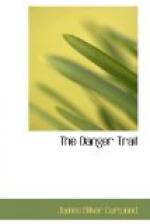He shrugged his shoulders and started the dogs into a trot.
“Look here,” cried Howland, running beside him. “Who is with this other sledge?”
“Those who tried to kill you on the trail and at the coyote, M’seur,” he answered quickly.
Howland fell half a dozen paces behind. By the end of the first hour he was compelled to rest frequently by taking to the sledge, and their progress was much slower. Jean no longer made answer to his occasional questions. Doggedly he swung on ahead to the right and a little behind the team leader, and Howland could see that for some reason Croisset was as anxious as himself to make the best time possible. His own impatience increased as the morning lengthened. Jean’s assurance that the mysterious enemies who had twice attempted his life were only a short distance behind them, or a short distance ahead, set a new and desperate idea at work in his brain. He was confident that these men from the Wekusko were his chief menace, and that with them once out of the way, and with the Frenchman in his power, the fight which he was carrying into the enemy’s country would be half won. There would then be no one to recognize him but Meleese.
His heart leaped with joyous hope, and he leaned forward on the sledge to examine Croisset’s empty gun. It was an automatic, and Croisset, glancing back over the loping backs of the huskies, caught him smiling. He ran more frequently now, and longer distances, and with the passing of each mile his determination to strike a decisive blow increased. If they reached the trail of Meleese and Jackpine before the crossing of the second sledge he would lay in wait for his old enemies; if they had preceded them he would pursue and surprise them in camp. In either case he would possess an overwhelming advantage.
With the same calculating attention to detail that he would have shown in the arrangement of plans for the building of a tunnel or a bridge, he drew a mental map of his scheme and its possibilities. There would be at least two men with the sledge, and possibly three. If they surrendered at the point of his rifle without a fight he would compel Jean to tie them up with dog-traces while he held them under cover. If they made a move to offer resistance he would shoot. With the automatic he could kill or wound the three before they could reach their rifles, which would undoubtedly be on the sledge. The situation had now reached a point where he no longer took into consideration what these men might be to Meleese.
As they continued into the northwest Howland noted that the thicker forest was gradually clearing into wide areas of small banskian pine, and that the rock ridges and dense swamps which had impeded their progress were becoming less numerous. An hour before noon, after a tedious climb to the top of a frozen ridge, Croisset pointed down into a vast level plain lying between them and other great ridges far to the north.




